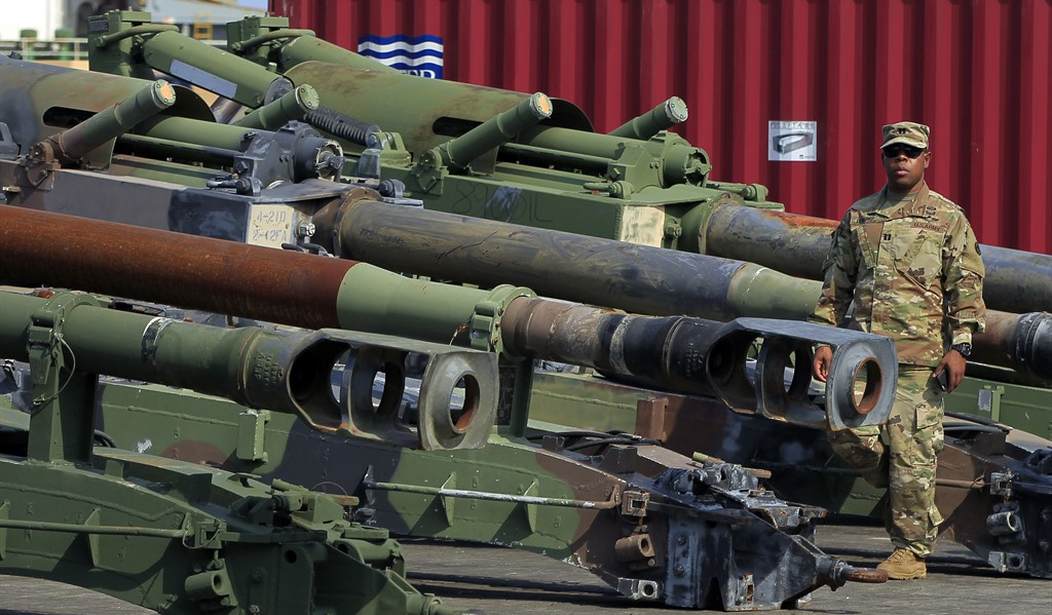At the end of the cold war, the talk in Washington was of the “peace dividend” — the end of prioritizing military spending and giving domestic policy priorities a huge cash windfall.
It never worked out that way. The military budget kept growing, and while there was a big increase in domestic spending, the military was finding new threats — real and imagined — to spend money protecting us from them.
One consequence of the end of the cold war was a radical consolidation of the defense industry. This was supposed to save money, but what it ended up doing was making the U.S. much more vulnerable to interruptions in critical supplies. The Wall Street Journal reports that “the number of fixed-wing aircraft suppliers in the U.S. has declined from eight to three. During the same period, major surface ship producers fell from eight to two, and today, only three American companies supply over 90% of the Pentagon’s missile stockpile.”
Fewer companies mean less competition and higher costs. So much for the “peace dividend.”
But nowhere was this consolidation more dangerous than it was in the manufacture of black powder. A factory in Louisiana is the sole source of black powder in the entire United States. What used to be called “gunpowder” has literally hundreds of military applications. The Defense Department relies on black powder to produce bullets, mortar shells, artillery rounds, and Tomahawk missiles. It’s used in small quantities to ignite more powerful explosives.
The factory was blown sky-high two years ago in an accident. The plant is still offline, meaning that production of some vital munitions — including bullets and artillery shells we’re sending to Ukraine — is on hold.
Today that’s emerging as a gnawing problem for the U.S., whether in supplying weapons and ammunition to Ukraine or in restocking reserves to prepare for a potential confrontation with China in the new era of great-power competition, according to U.S. military officials, defense experts and congressional staffers.
After months of supplying Ukraine with Stingers, howitzers, anti-armor systems and artillery ammunition, stocks are low in both the U.S. and its NATO allies, especially in 155mm howitzer shells, an ammunition that has been crucial to pushing back Russian forces.
“Can you imagine what would happen to these supply chains if the U.S. were in an actual state of active war, or NATO was?” said Jeff Rhoads, executive director of the Purdue Institute for National Security, a defense-research Institute at Purdue University. “They could be in trouble very quickly.”
It gets worse. This “single source” gunpowder plant is joined by a single plant that manufactures the titanium castings used in howitzers, and only one company makes the rocket motor used in the Javelin antitank weapon widely used in Ukraine.
So it’s not just black powder that’s become a choke point in the military supply chain.
Chokepoints are one of a number of weaknesses in the U.S. military’s supply chains. Others include a lack of skilled workers in casting and forging, shortages of infrastructure for battery technology and periodic shortages of advanced microchips.
Some domestic suppliers have quit unprofitable businesses altogether, leaving it to both allies and adversaries to supply commodities such as the rare earth minerals used in state-of-the-art technology. The Pentagon has invested more than $100 million in the mining and processing of such minerals in the U.S. after American companies ceded production to China.
If we went to war with China, any extended conflict would place the nation in peril because those rare earth minerals that China has cornered are vital to the operation of electric motors and magnets — two applications that would be critical in any extended military conflict.
“China has a significant dominance of rare earths, and in the back of people’s mind is always the idea of geopolitical tensions and how that could affect production and exports,” said Luisa Moreno, president of Defense Metals Corp., a development-stage mining company based in Vancouver, Canada. “There is not a lot of production outside of China and so in order to supply the market with rare-earth products we will have to bring other projects into production.”
Second-guessing decisions made 25 years ago to consolidate the defense industry isn’t helpful. It’s what we do going forward that matters. Time is running short to ease these supply problems and get America’s military supply industries back on track.
